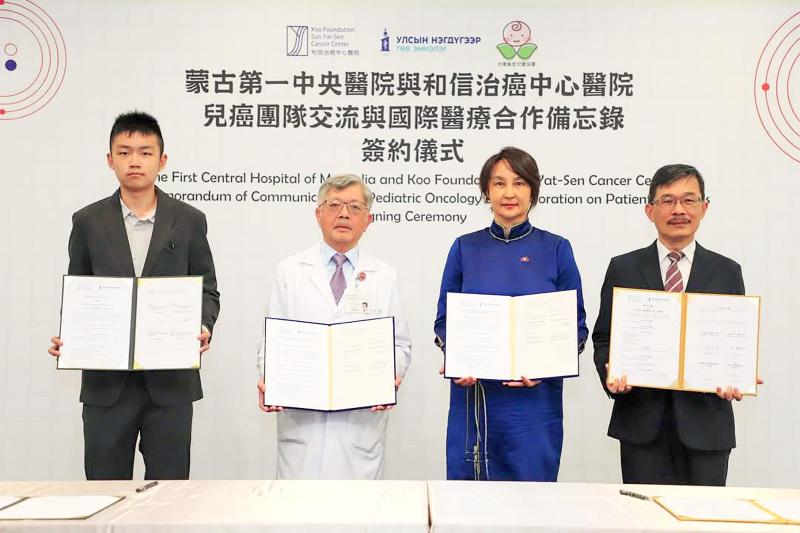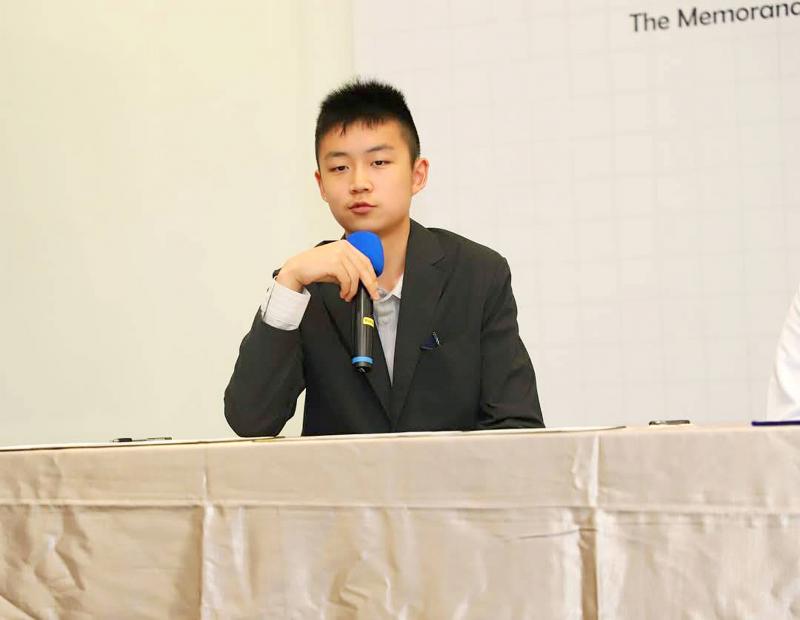Fourteen-year-old Shaun Shaw was once a patient with bone marrow failure — specifically, severe aplastic anemia. Now fully recovered for five years, he has not only returned to his regular life, but also helped facilitate a collaboration between Taiwan’s Koo Foundation Sun Yat Sen Cancer Center (KFSYSCC) and Mongolia’s First Central Hospital, building a bridge of international medical cooperation for more children in need.
KFSYSCC and Mongolia’s First Central Hospital signed a Genetic Diseases and Cancer Exchange Platform and International Medical Cooperation Memorandum of Understanding on Friday last week.

The two parties are to collaborate on sharing treatment experiences and referring patients in the field of genetic diseases, aiming to expand treatment possibilities for patients with rare diseases and hard-to-treat cancers.

KFSYSCC president Dr Nei-Min Chu said that the hospital frequently treats complex genetic disorders and hematologic tumors, such as fibrodysplasia ossificans progressiva (FOP), germ cell tumors and malignant gene-mutated myeloid leukemia.
Over time, the medical center has accumulated extensive experience in understanding disease mechanisms and advancing treatment techniques.
The signing of the Genetic Diseases and Cancer Exchange Platform and International Medical Cooperation Memorandum with Mongolia marks the starting point for sharing KFSYSCC medical expertise with the international community.
This international collaboration not only pushes the limits of what healthcare can reach, but also reinforces KFSYSCC’s founding commitment to protecting life.
It shows that compassionate care without borders is not just a vision — it is a path we are actively walking, one step at a time.

Taiwanese scientists have engineered plants that can capture about 50 percent more carbon dioxide and produce more than twice as many seeds as unmodified plants, a breakthrough they hope could one day help mitigate global warming and grow more food staples such as rice. If applied to major food crops, the new system could cut carbon emissions and raise yields “without additional equipment or labor costs,” Academia Sinica researcher and lead author the study Lu Kuan-jen (呂冠箴) said. Academia Sinica president James Liao (廖俊智) said that as humans emit 9.6 billion tonnes of carbon dioxide compared with the 220 billion tonnes absorbed

The Taipei Mass Rapid Transit (MRT) Wanda-Zhonghe Line is 81.7 percent complete, with public opening targeted for the end of 2027, New Taipei City Mayor Hou You-yi (侯友宜) said today. Surrounding roads are to be open to the public by the end of next year, Hou said during an inspection of construction progress. The 9.5km line, featuring nine underground stations and one depot, is expected to connect Chiang Kai-shek Memorial Hall Station to Chukuang Station in New Taipei City’s Jhonghe District (中和). All 18 tunnels for the line are complete, while the main structures of the stations and depot are mostly finished, he

Taipei is to implement widespread road closures around Taipei 101 on Friday to make way for large crowds during the Double Ten National Day celebration, the Taipei Department of Transportation said. A four-minute fireworks display is to be launched from the skyscraper, along with a performance by 500 drones flying in formation above the nearby Nanshan A21 site, starting at 10pm. Vehicle restrictions would occur in phases, they said. From 5pm to 9pm, inner lanes of Songshou Road between Taipei City Hall and Taipei 101 are to be closed, with only the outer lanes remaining open. Between 9pm and 9:40pm, the section is

China’s plan to deploy a new hypersonic ballistic missile at a Chinese People’s Liberation Army Rocket Force (PLARF) base near Taiwan likely targets US airbases and ships in the western Pacific, but it would also present new threats to Taiwan, defense experts said. The New York Times — citing a US Department of Defense report from last year on China’s military power — on Monday reported in an article titled “The missiles threatening Taiwan” that China has stockpiled 3,500 missiles, 1.5 times more than four years earlier. Although it is unclear how many of those missiles were targeting Taiwan, the newspaper reported